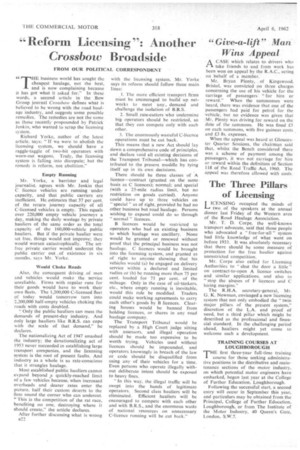"Reform Licensing": Another Crossbow Broadside
Page 56

If you've noticed an error in this article please click here to report it so we can fix it.
FROM OUR POLITICAL CORRESPONDENT
44 HE business world has sought the
cheapest haulage, not the best, and is now complaining because it has got what it asked for." In these words, a second article in the Bow Group journal Crossbow defines what is believed to be wrong with the road haulage industry, and suggests some possible remedies. The remedies are not the same as those recently propounded by Patrick Jenkin, who wanted to scrap the licensing system.
Richard Yorke, author of the latest article. szo.s: " If we were to abolish the licensing system, we should have a raggle-taggle of two-bit operators with worn-out wagons. Truly, the licensing system is falling into disrepute; but the remedy is reform, not abolition."
Empty Running
Mr. Yorke, a barrister and legal journalist, agrees with Mr. Jenkin that C licence vehicles are running under capacity, and that public carriers are inefficient. He estimates that 37 per cent. of the return journey capacity of all C-licensed vehicles is empty. This equals over 220,000 empty vehicle journeys a day, making the daily wastage by private hauliers of the same order as the total capacity of the 160,000-vehicle public hauliers. But if the private haulier were set free, things would not improve; they would worsen catastrophically. The setfree private carrier would undercut the public carrier out _of existence in six months, says Mr. Yorke.
Would Choke Roads
Also, the consequent driving of men and vehicles would make the service unreliable. Firms with regular runs for their goods would have to work their own fleets. The 1,200,000 C-licensed fleet of today would tomorrow turn into 1200,000 half-empty vehicles choking the roads with costs doubled.
"Only the public hauliers can meet the demands of present-day industry. And only large hauliers like B.R.S. can cope with the scale of that demand," he declares.
The nationalizing Act of 1947 smashed the industry; the denationalizing act of 1953 never succeeded in establishing large transport companies, and the licensing system is the root of present faults. And industry as a whole is so rate-conscious that it strangles haulage.
Most established public hauliers cannot expand beyond a quickly-reached limit of a few vehicles because, when increased overheads and dearer rates enter the picture. half their custom deserts to the firm round the corner who can undercut. "This is the competition of the rat race, benefiting no one, destroying where it should create," the article declares.
After further discussing what is wrong B22
with the licensing system, Mr. Yorke says its reform should follow three main lines: .1. The more efficient transport firms must be encouraged to build up networks to meet anydemand and challenge the isolation of B.R.S.
2. Small rate-cutters who undermine big operators should be restricted, so that they can compete only with each other.
3. The enormously wasteful C-licence operations must be cut back.
This means that a new Act should lay down a comprehensive code of principles, and declare void all existing decisions of the Transport Tribunal—which has contributed to the present muddle by tying itself up in its own decisions.
There should be three classes of A licence—contract (granted on the same basis as C licences); normal; and special (with a 25-mile radius limit, but no restriction on goods carried). Anyone could have up to three vehicles on special " as of right, provided he had no other business but road haulage. Persons wishing to expand could do so through normal licences.
B licences would be restricted tO operators who had an existing business to which haulage was ancillary. None would be granted or renewed without proof that the principal business was not haulage. C licences would be brought into the licensing system, and granted as of right to anyone showing that his vehicles would (a) be engaged on delivery service within a declared and limited radius or (b) be running more than 75 per cent. loaded for 75 per cent, of the mileage. Only in the case of oil-tankers, etc., where empty running is inevitable, would this rule be modified. Traders could make working agreements to carry each other's goods by B licences. Clearing houses would be banned from holding licences, or shares in any road haulage company.
The Transport Tribunal would be replaced by a High Court judge sitting with assessors, and illegal operation should be made too expensive to be worth trying. Vehicles used without licences should he impounded, and operators knowingly in breach of the law or code should be disqualified from using any of their vehicles for a time. Even persons who operate illegally without deliberate intent should be exposed to heavy fines.
" In this way, the illegal traffic will be swept into the hands of legitimate operators. Second class hauliers will be eliminated. Efficient hauliers will be encouraged to compete with each other and with B.R.S., and the enormous waste of national resources on unnecessary C-licence running will be cut back."




















































































































































